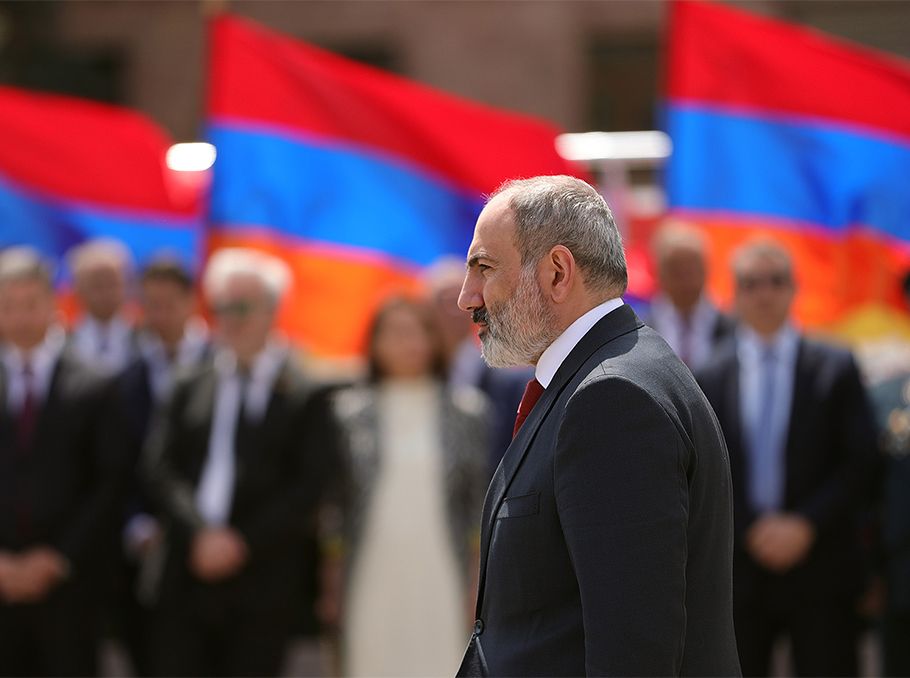Pashinyan's nurturing separatism - serious setbacks in peace process

The peace talks between Azerbaijan and Armenia have almost come to a halt. Although the main cause of this is the incompetent government of Armenia, the influence of separatist forces within the country cannot be excluded. Some individuals believe in the "existence" of the independence day of the fictitious state that separatist elements tried to establish after Armenia's occupation of Azerbaijani territories.
Led by Archbishop Bagrat Galstanyan, anti-Pashinyan protests spread this belief, further dragging the country into a more complex political crisis. The leader of the revanchist movement called on Armenians to gather in front of the "representation" of the former illegal separatist junta of Garabagh in Yerevan to celebrate the mythical "independence day of Artsakh," thus attempting to stir new discontent among the population.
Celebrating the independence day of the so-called "Artsakh" undoubtedly escalates tensions in the region. Armenia's support for such actions within the country, and turning a blind eye to territorial claims on Azerbaijani lands under the guise of democracy, is unacceptable.
It should be noted that one of the primary obstacles to signing a peace treaty is Armenia's territorial claims over Azerbaijan, which is reflected both in the country's constitution and in its political agenda. The Armenian constitution even contains references to territorial claims over Azerbaijan and Turkiye, and one of Azerbaijan’s rightful conditions for peace is the amendment of this constitution. However, Armenia's delay in making constitutional changes until 2027 and the continued illegal acts of the so-called regime in Armenia hinder the peace process.
For trust in the peace process to develop, Armenia must abandon these disloyal actions. Despite promises to open the Zangazur corridor and ensure the security of transport and communication routes, Armenia’s support for separatism casts doubt on the sincerity of such security assurances.
Nikol Pashinyan’s inability to combat separatist forces domestically, or his cooperation with them, along with his attempts to appease the former opposition leaders to maintain power, pose serious threats to the future security of Armenia and the South Caucasus. Armenia’s duplicitous policies complicate the peace process and obstruct regional stability.
It can be concluded that Armenia recognizes Azerbaijan’s territorial integrity only in words. In reality, the country is still striving to realize the fantasy of a "Greater Armenia" or Miatsum. The delay in amending the constitution demonstrates that Armenia's leadership is not genuinely interested in signing a bilateral agreement for peace and establishing inter-state relations with Azerbaijan.
Currently, Armenia is actively purchasing weapons and ammunition from France and India. This clearly shows that militarization and preparing for a potential new conflict with Azerbaijan remain priorities in Armenia's state policy.
The revitalization of revanchists in Armenia and the Armenian diaspora abroad, the rapid militarization of the country, provocative actions by France and the U.S., and Pashinyan’s refusal to close the office of the separatist regime and amend the constitution, all indicate that Yerevan is trapped in a revenge-driven mindset. However, the Armenian government must understand that this idea could lead Armenia to a great catastrophe. If the government, despite the risks, chooses this path, it must reveal its true intentions.
It is worth noting that the so-called "Republic of Artsakh" was created on September 2, 1991, within the borders of the former so-called Nagorno-Karabakh Autonomous Region and the adjacent Shahumyan district. Later, Armenia occupied seven districts of Azerbaijan (Aghdam, Fuzuli, Jabrayil, Zangilan, Gubadli, Lachin, and Kalbajar) and annexed them to the so-called republic. The regime, fully supported by Armenia, used these surrounding districts as a buffer zone, a security belt. In September 2023, as a result of anti-terror operations internally carried out by Azerbaijan, the illegal regime that had existed for 32 years on these lands was dismantled.
However, some of the steps taken by Armenia contributed to the initiation of these anti-terror operations. Although Pashinyan declared recognition of Azerbaijan’s territorial integrity and sovereignty during the quadrilateral meeting of the "European Political Community" summit held in Prague in October 2022, the following year, on September 2, he sent a congratulatory letter to the regime on the anniversary of the declaration of independence of the so-called Nagorno-Karabakh. On September 9, "presidential elections" were held in the part of the Garabagh economic region. Those events pushed Azerbaijan’s patience to its limits, leading to the anti-terror operations.
Based on these events, Armenia must understand that it should refrain from provoking Azerbaijan. Baku will no longer tolerate Armenian provocations or insinuations.
---
Follow us on Twitter @AzerNewsAz
Here we are to serve you with news right now. It does not cost much, but worth your attention.
Choose to support open, independent, quality journalism and subscribe on a monthly basis.
By subscribing to our online newspaper, you can have full digital access to all news, analysis, and much more.
You can also follow AzerNEWS on Twitter @AzerNewsAz or Facebook @AzerNewsNewspaper
Thank you!

